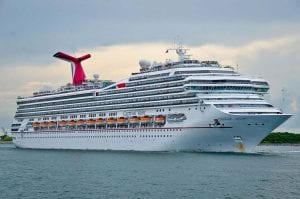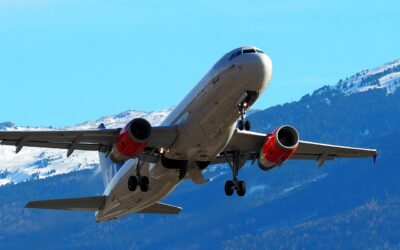I have 10 costly cruise mistakes every passenger must avoid.
 If you’ve never cruised before, there are serious potential problems to avoid. Prevent expensive mistakes when cruising, particularly for a cruise that visits international ports. Poor weather may delay getting to the embarkation. An expired passport, lost or delayed luggage, smoking, and not returning to the ship on time can all be very costly.
If you’ve never cruised before, there are serious potential problems to avoid. Prevent expensive mistakes when cruising, particularly for a cruise that visits international ports. Poor weather may delay getting to the embarkation. An expired passport, lost or delayed luggage, smoking, and not returning to the ship on time can all be very costly.
Here are my ten cruise mistakes that are too costly to make.
Scheduling a last minute flight to your port of embarkation and not slipping AirTags into your luggage can cost you dearly.
Don’t schedule a last-minute flight for your cruise embarkation:
If you’re late for your ship’s embarkation, your ship will sail without you.
Several years ago, a friend scheduled his flight to land just four hours before his ship sailed to Hawaii. The flight was delayed and landed after his ship had sailed. His ship was at sea for the next five days. He had to buy an expensive last-minute flight to Hawaii and book a hotel. He missed 31 percent of his cruise. As it was his mistake, he got no refund nor reimbursement for his extra expenses.
I typically arrive at a domestic cruise embarkation port two days in advance and an international embarkation port, three to five days in advance of sailing. Those rules have saved me from missing several cruises.
Not using Apple AirTags in your luggage:
I’ve discussed using Apple AirTags for air travel often. They’re just as valuable for cruise travel, to help locate lost, delayed or missing luggage. On my recent Australia cruise, with just an hour left before sailing, my luggage was still missing. With the aid of my AirTag, the ship’s head concierge finally located my bag in a back room as the gangway was being pulled into the ship. Wherever you’re traveling, use an AirTag or its equivalent. Don’t leave home without it.
Not knowing that your passport is good for your cruise long before you leave and not purchasing travel insurance for your cruise are potentially two of the most costly mistakes cruisers can make.
Not knowing your destinations’ passport rules and your passport expiration date:
Too many Americans think that their passport can be used until it expires. It’s not true. Many countries require passports to be valid for at least three months beyond the traveler’s date of departure from their country and for many others, six months.
If your passport doesn’t meet the requirements of your cruise destinations, you’ll be denied boarding. According to the cruise’s cost, you could be out a small fortune. So, check the passport requirements for each destination you intend to visit. Then check your passport’s expiration date. If you don’t have a multi-month buffer, renew your passport immediately.
Not purchasing travel insurance from an independent travel insurance company:
Cruises, particularly longer ones and those to exotic locations, and international plane flights can be very expensive. I always purchase trip insurance that covers me if I need to cancel my trip for any reason and all risks from a highly reputable insurance company. Use an independent insurance company because I’ve found that most cruise line policies aren’t as good as the ones I want, particularly if I’m doing anything independent from the cruise package. Always include medical coverage too, essential for U.S. seniors internationally, because Medicare doesn’t cover you outside the U.S.
In 2025, if you don’t protect yourself from norovirus you could miss much of your cruise in agony, stuck in your cabin for days.
Not following every day sanitation protocols:
Already in 2025, there have been 16 outbreaks of norovirus or E.coli sickening many passengers and crew on cruise ships, just two fewer outbreaks than in all of 2024.
Norovirus is highly contagious. Lasting from one to three days, it causes diarrhea, vomiting, nausea, and severe stomach pain. Those infected can spread the disease for a while after they feel better. You can get norovirus by consuming contaminated food or water. Don’t touch your hand to your mouth after touching a contaminated surface. Or, don’t spend time with someone infected with it.
You can protect yourself to a considerable extent by washing your hands thoroughly with soap and water for at least 20 seconds, particularly after using a toilet, changing a diaper or before eating or drinking anything. If you can’t wash, use an alcohol based hand sanitizer.
Using your cellphone on board without a cellular or cruise line Internet package:
Using your cellphone at sea can be costly, especially if you haven’t pre-purchased a data/call plan from your cellular provider. If you need Internet or want to make calls from your cellphone, if Internet isn’t free on board your ship, consider buying a WiFi package, as it will likely be far less expensive than other options. If you want to make cellular calls while at sea, look into purchasing a cruise plan from your cellular provider. You can also use your cellphone’s ability to make phone calls via WiFi if you must call from the ship.
Smoking in your cabin or its balcony and bringing aboard marijuana to smoke can get you, at the least, thrown off your cruise and left to make your own way home and pay dearly for it.
Smoking in your cabin or its balcony:
If you’re a smoker, be aware that smoking is significantly limited on cruise ships. In general, smoking, including vaping, is strictly forbidden in cruise ship cabins, verandas and most every public indoor area. Most ships have limited areas outside at which you can smoke. Cruise ship passengers who violate their ship’s smoking rules will incur a fine and/or cleaning fee and may be kicked off the ship at the next port.
Bringing marijuana on board:
Cruise lines, even ones that start and stop in the U.S. are regulated by U.S. federal laws and other nations’ national laws where they visit. Cruise lines prohibit the transport and use of illegal substances such as marijuana, with no exceptions whatsoever for medical use, including edibles. Remember that outside of the U.S. at international destinations, the penalty for drug possession is often far more severe than in the U.S. Just leave it at home.
You could miss the very excursion you booked the whole cruise for if you don’t reserve excursions, specialty dining and other ship extras as soon as available. You could also miss much of your cruise if you ignore port sailing times.
Waiting too long to book your shore excursions, specialty dining, spa treatments, cooking and other courses, etc.:
On large or small ships, you can often make many reservations long before your ship sails. If you wait until you board, you’ll likely miss your first or possibly second choice for specialty dining. You’ll also miss the listings for spa treatments and particularly shore excursions, plus many other activities on large ships. In fact, if you wait too long to book, you may miss the excursion you booked your entire cruise to take.
The moment reservations are open online for your cruise, make every reservation you want. The starting time should be generally weeks or months before your embarkation date. You won’t be sorry you did.
Ignoring in-port sailing times:
Over the years, I haven’t booked many third-party excursions at cruise ship ports of call. I’ve done it to do something the ship excursions missed or to save money. I am very careful when booking those tours to ensure that they build in plenty of return-time leeway. I’ve seen passengers arrive at the dock just minutes after we sailed, then take days to meet the ship at another port.
If you don’t make these mistakes, you may still not have a perfect voyage, but making them will likely cost you dearly in your wallet and in your enjoyment.
READ ALSO:
One level of airline safety rules — that’s the mantra at DOT & FAA, unless …
Stop costly missed airline connections caused by the aviation system
After many years working in corporate America as a chemical engineer, executive and eventually CFO of a multinational manufacturer, Ned founded a tech consulting company and later restarted NSL Photography, his photography business. Before entering the corporate world, Ned worked as a Public Health Engineer for the Philadelphia Department of Public Health. As a well known corporate, travel and wildlife photographer, Ned travels the world writing about travel and photography, as well as running photography workshops, seminars and photowalks. Visit Ned’s Photography Blog and Galleries.



